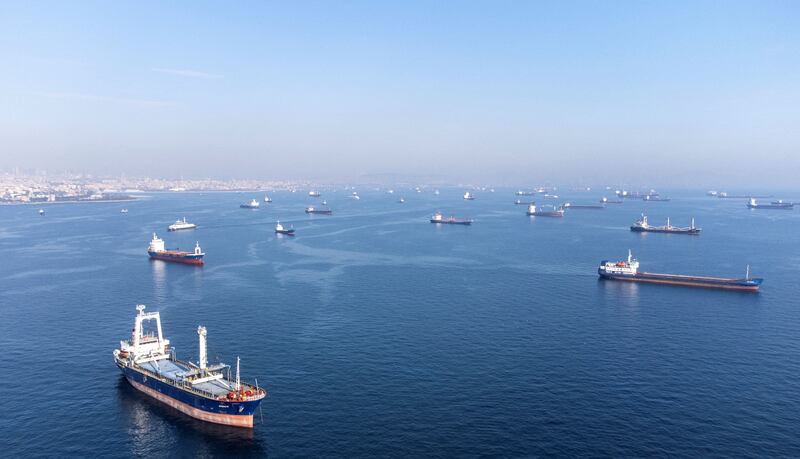UN Secretary General Antonio Guterres was expected to meet EU leaders on Thursday in Brussels to discuss a crucial grain deal that enables the safe export of Ukrainian grain through the Black Sea, amid a continuing war.
The UN and Turkey first brokered the pact with Russia and Ukraine in July last year.
Turkey announced the renewal of the deal on Saturday, but Russia has refused to extend the pact for 120 days as expected, saying it would only allow it to continue for 60 days instead.
The UN is overseeing closed-door negotiations with Russia. Moscow's demands for allowing the deal to continue are in part directed towards Brussels.
“We aren’t in charge of these discussions with Russia but it [the agreement] will probably be discussed with the UN Secretary General,” an EU diplomat said. EU leaders, who are meeting for two days in Brussels on Thursday, are also expected to discuss the war in Ukraine among other topics with Mr Guterres.
Russia’s Foreign Ministry on Monday laid out its conditions for a further extension of the so-called Black Sea Grain Initiative. They include the restoration of access to the Swift financial messaging system for Russian state-owned agriculture-focused bank Rosselkhozbank, a resumption of farm machinery supplies, and the unblocking of foreign assets and accounts held by Russian agricultural companies.
Russia’s demands come despite the fact that the EU deliberately exempted its agriculture sector from sanctions. Brussels blames Russia for the spike in food insecurity in the world that followed Moscow’s invasion of Ukraine last year. Both Russia and Ukraine are major grain and fertiliser exporters.
Russia made similar requests when the grain deal was renewed in November, but ultimately approved the 120-day rollover, saying it had received reassurance that its concerns would be addressed. Neither the UN nor western countries made such promises publicly.
Russian exports of wheat and certain types of fertilisers increased last year, indicating that exports are not as affected as Moscow claims, analysts previously told The National. Moscow stopped releasing export data after the start of the war.
The EU, as well as the UN, Turkey and Ukraine, wanted the Black Sea Grain Initiative, which expired last Saturday, to be extended for 120 days as laid out in the initial agreement.
But Russia accuses the West of not collaborating with the UN in carrying out a separate agreement, signed on the same day as the grain deal, to enable the export of Russian food and fertilisers to world markets.
Questioned by The National, an EU official declined to disclose details of negotiations with Russia but said the UN was trying to find a compromise.
“Some delegations are very cautious with fertilisers,” they said.
Several countries including Lithuania, Latvia, Estonia and Poland opposed the EU’s exemption for fertilisers in the past, arguing that fertiliser companies are linked to Russian President Vladimir Putin and funding of the war in Ukraine.
The EU Commission has set up a system of checks to ensure that sanctioned Russian individuals do not benefit from the exports.
“Transit and payments are possible,” said the EU diplomat, referring to Russian agricultural exports via the EU.
“There might be issues regarding banks that were removed from Swift but that does not mean that payments cannot happen,” they added.
“We can always check if there are elements of friction in some places, but let’s not fall into promoting the narrative that sanctions caused food security issues.”
Blocking the deal would likely prove unpopular in Africa and the Middle East, which rely heavily on Russian and Ukrainian agricultural products.
Speaking at a Russia-Africa parliamentary conference in Moscow on Monday, Russian President Vladimir Putin said the renewal of the deal on Moscow's terms was in the continent's interests.
Mr Putin said that if the deal is not renewed, Moscow could supply free grain to “especially needy African countries”, without elaborating. So far, exports under the grain deal have been transported under commercial agreements.
The US on Tuesday pushed back against Russian demands. A US State Department representative said that Russian food and fertiliser exports are tracking with previous years and Ukraine's exports of food are down by more than a third.
“The only prohibitions on food and fertiliser exports from Russia are those imposed by the Government of the Russian Federation,” the representative said. “Russia is the one restricting its exports — it imposed export quotas on certain fertilisers, and recently extended them through the spring.”







